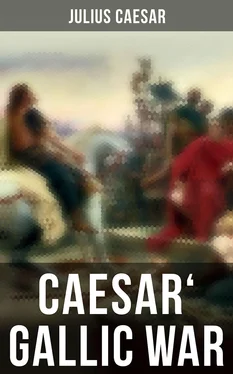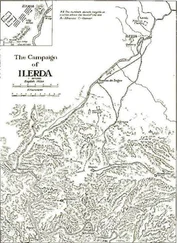XXXI.—But when they saw that it was being moved, and was approaching their walls, startled by the new and unaccustomed sight, they sent ambassadors to Caesar (to treat) about peace; who spoke in the following manner: "That they did not believe the Romans waged war without divine aid, since they were able to move forward machines of such a height with so great speed, and thus fight from close quarters: that they resigned themselves and all their possessions to (Caesar's) disposal: that they begged and earnestly entreated one thing, viz., that if perchance, agreeably to his clemency and humanity, which they had heard of from others, he should resolve that the Aduatuci were to be spared, he would not deprive them of their arms; that all their neighbours were enemies to them and envied their courage, from whom they could not defend themselves if their arms were delivered up: that it was better for them, if they should be reduced to that state, to suffer any fate from the Roman people, than to be tortured to death by those among whom they had been accustomed to rule."
XXXII.—To these things Caesar replied, "That he, in accordance with his custom, rather than owing to their desert, should spare the state, if they should surrender themselves before the battering-ram should touch the wall; but that there was no condition of surrender, except upon their arms being delivered up; that he should do to them that which he had done in the case of the Nervii, and would command their neighbours not to offer any injury to those who had surrendered to the Roman people." The matter being reported to their countrymen, they said that they would execute his commands. Having cast a very large quantity of their arms from the wall into the trench which was before the town, so that the heaps of arms almost equalled the top of the wall and the rampart, and nevertheless having retained and concealed, as we afterwards discovered, about a third part in the town, the gates were opened, and they enjoyed peace for that day.
XXXIII.—Towards evening Caesar ordered the gates to be shut, and the soldiers to go out of the town, lest the townspeople should receive any injury from them by night. They (the Aduatuci), by a design before entered into, as we afterwards understood, because they believed that, as a surrender had been made, our men would dismiss their guards, or at least would keep watch less carefully, partly with those arms which they had retained and concealed, partly with shields made of bark or interwoven wickers, which they had hastily covered over with skins (as the shortness of time required) in the third watch, suddenly made a sally from the town with all their forces (in that direction) in which the ascent to our fortifications seemed the least difficult. The signal having been immediately given by fires, as Caesar had previously commanded, a rush was made thither ( i.e. by the Roman soldiers) from the nearest fort; and the battle was fought by the enemy as vigorously as it ought to be fought by brave men, in the last hope of safety, in a disadvantageous place, and against those who were throwing their weapons from a rampart and from towers; since all hope of safety depended on their courage alone. About 4000 of the men having been slain, the rest were forced back into the town. The day after, Caesar, after breaking open the gates, which there was no one then to defend, and sending in our soldiers, sold the whole spoil of that town. The number of 53,000 persons was reported to him by those who had bought them.
XXXIV.—At the same time he was informed by P. Crassus, whom he had sent with one legion against the Veneti, the Unelli, the Osismii, the Curiosolitae, the Sesuvii, the Aulerci, and the Rhedones, which are maritime states, and touch upon the (Atlantic) ocean, that all these nations were brought under the dominion and power of the Roman people.
XXXV.—These things being achieved, (and) all Gaul being subdued, so high an opinion of this war was spread among the barbarians, that ambassadors were sent to Caesar by those nations who dwelt beyond the Rhine, to promise that they would give hostages and execute his commands. Which embassies Caesar, because he was hastening into Italy and Illyricum, ordered to return to him at the beginning of the following summer. He himself, having led his legions into winter-quarters among the Carnutes, the Andes, and the Turones, which states were close to those regions in which he had waged war, set out for Italy; and a thanksgiving of fifteen days was decreed for those achievements, upon receiving Caesar's letter; (an honour) which before that time had been conferred on none.
Конец ознакомительного фрагмента.
Текст предоставлен ООО «ЛитРес».
Прочитайте эту книгу целиком, купив полную легальную версию на ЛитРес.
Безопасно оплатить книгу можно банковской картой Visa, MasterCard, Maestro, со счета мобильного телефона, с платежного терминала, в салоне МТС или Связной, через PayPal, WebMoney, Яндекс.Деньги, QIWI Кошелек, бонусными картами или другим удобным Вам способом.












